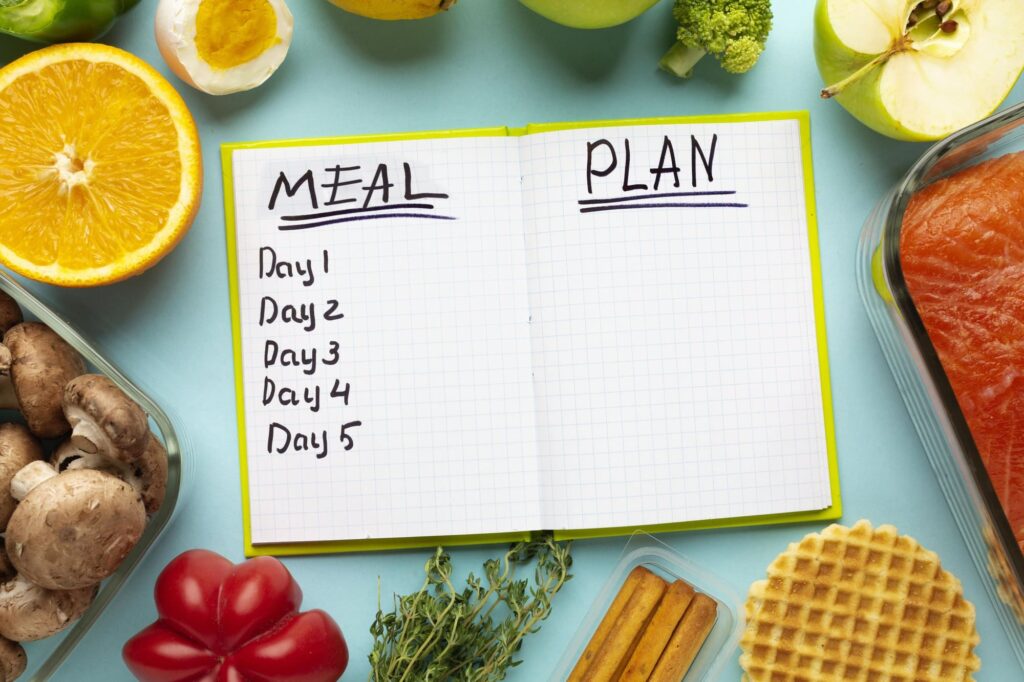
Save money, reduce waste, and eat better with these simple meal planning tips!
Meal planning is one of the easiest ways to save money on groceries, avoid food waste, and eat healthier. By taking just a little time each week to plan your meals, you can make your shopping trips more efficient and stay within your budget. In this guide, we’ll walk you through the steps to plan affordable, delicious meals for the entire week.
1. Set a Weekly Food Budget
Start by deciding how much you want to spend on food each week. This gives you a clear target and helps you make smarter decisions at the store.
Example:
- For a family of four, a budget of $100/week is a good starting point. Adjust based on your family size and dietary preferences.
📌 Pro Tip: Track your spending for a month to determine a realistic budget.
2. Check Your Pantry and Fridge
Take inventory of what you already have before making a meal plan. This avoids buying duplicate items and helps you use up ingredients before they expire.
How to do it:
- Make a list of pantry staples (e.g., rice, pasta, canned goods).
- Check the fridge for perishable items that need to be used soon.
📌 Pro Tip: Plan meals around what you already have, like turning leftover veggies into a stir-fry or soup.
3. Plan Simple, Flexible Meals
Choose recipes that use versatile ingredients and are easy to adapt. This keeps your shopping list shorter and reduces waste.
Example Meal Plan:
- Monday: Spaghetti with marinara sauce
- Tuesday: Vegetable stir-fry with rice
- Wednesday: Lentil soup with bread
- Thursday: Baked chicken with roasted vegetables
- Friday: Tacos with beans and cheese
📌 Pro Tip: Double recipes so you can enjoy leftovers for lunch or dinner later in the week.
4. Focus on Seasonal and Sale Items
Plan your meals around ingredients that are in season or on sale. This not only saves money but also ensures fresher, tastier meals.
How to do it:
- Check your local grocery store’s weekly ads or use an app like Flipp to find deals.
- Incorporate seasonal produce into your meals, like squash in the fall or berries in the summer.
📌 Pro Tip: Buy proteins like chicken or ground beef in bulk during sales and freeze them for future meals.
5. Batch Cook and Prep Ahead
Save time and money by cooking large quantities of food and prepping ingredients in advance.
Ideas for Batch Cooking:
- Make a big pot of soup or chili and freeze individual portions.
- Cook a large batch of rice or quinoa to use throughout the week.
- Pre-chop vegetables for salads, stir-fries, or snacks.
📌 Pro Tip: Store prepped ingredients in clear containers so you can easily see what’s ready to use.
6. Make a Detailed Shopping List
A detailed shopping list ensures you only buy what you need, avoiding impulse purchases and staying within your budget.
How to create it:
- Write down all the ingredients you need for the week’s meals.
- Organize your list by grocery store sections (e.g., produce, dairy, canned goods).
📌 Pro Tip: Use apps like AnyList or Flipp to create and organize your list digitally.
7. Stick to Your Plan
Finally, follow your meal plan as closely as possible to maximize your savings. Life can be unpredictable, so it’s okay to make small adjustments, but try to avoid unnecessary takeout or additional trips to the store.
Example:
- Reserve one day for leftovers or a “clean out the fridge” meal to avoid waste.
📌 Pro Tip: Keep a few easy-to-make meals, like pasta or soup, as backups for busy days.
Quick Reference Table: Budget-Friendly Meal Planning in 7 Steps
| Step | Why It Saves Money | Pro Tip |
|---|---|---|
| Set a Weekly Budget | Helps control overall spending | Start with $25/person/week. |
| Check Pantry & Fridge | Avoids buying duplicates | Plan meals around what you already have. |
| Plan Flexible Meals | Uses versatile, affordable ingredients | Include rice, pasta, and seasonal veggies. |
| Focus on Seasonal Sales | Reduces costs on fresh ingredients | Buy produce in season or on sale. |
| Batch Cook & Prep | Saves time and reduces food waste | Freeze portions for busy days. |
| Make a Shopping List | Prevents impulse purchases | Use apps like Flipp to organize your list. |
| Stick to Your Plan | Keeps you on track with your budget | Reserve one day for leftovers. |
Conclusion
Planning your meals doesn’t have to be complicated, but it can make a huge difference in your budget and stress levels. By setting a budget, checking your pantry, and focusing on simple, seasonal meals, you can save money and enjoy delicious, home-cooked food all week long. Start small and see how much you can save with these easy tips!

